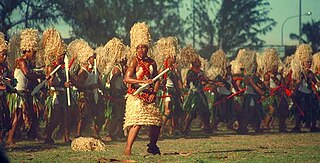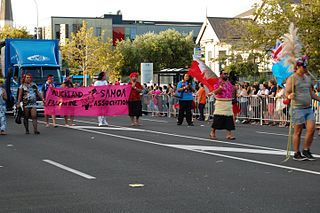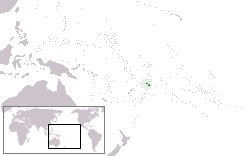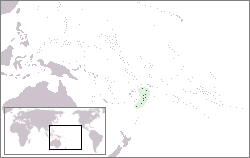The Miss Galaxy Pageant is an annual event held in Nukuʻalofa, Tongatapu in the Kingdom of Tonga that selects the "best" Fakaleiti. The event is held over a three night period and attracts crowds of up to 5000 people per night. The pageant has been operating since the mid-1990s and has become a major attraction for Tongans and tourists. Attendance by academics include Professors Niko Besnier, Heather Young-Leslie and Michael Poltorak, and international celebrities such as Pamela Stephenson, Michael Wilson and Minnie Driver.
Māhū in Kanaka Maoli (Hawaiian) and Maohi (Tahitian) cultures are third gender persons with traditional spiritual and social roles within the culture, similar to Tongan fakaleiti and Samoan fa'afafine. Kāne (men) who have sexual relationships with men are Aikāne.
The Sylvia Rivera Law Project (SRLP) is a legal aid organization based in New York City at the Miss Major-Jay Toole Building for Social Justice that serves low-income or people of color who are transgender, intersex and/or gender non-conforming. The organization was formed in August 2002 by attorney and transgender civil rights activist, Dean Spade. The project was named for Sylvia Rivera, a transgender activist and veteran of the 1969 Stonewall Riots, who died the same year that SRLP was formed.

The Tongan archipelago has been inhabited for perhaps 3000 years, since settlement in late Lapita times. The culture of its inhabitants has surely changed greatly over this long time period. Before the arrival of European explorers in the late 17th and early 18th centuries, the Tongans were in frequent contact with their nearest Oceanic neighbors, Fiji and Samoa. In the 19th century, with the arrival of Western traders and missionaries, Tongan culture changed dramatically. Some old beliefs and habits were thrown away and others adopted. Some accommodations made in the 19th century and early 20th century are now being challenged by changing Western civilization. Hence Tongan culture is far from a unified or monolithic affair, and Tongans themselves may differ strongly as to what it is "Tongan" to do, or not do.

Faʻafafine are people who identify themselves as having a third-gender or non-binary role in Samoa, American Samoa and the Samoan diaspora. A recognized gender identity/gender role in traditional Samoan society, and an integral part of Samoan culture, faʻafafine are assigned male at birth, and explicitly embody both masculine and feminine gender traits in a way unique to Polynesia. Their behaviour typically ranges from extravagantly feminine to conventionally masculine.

Mālietoa is a state dynasty and chiefly title in Samoa. Literally translated as "great warrior", the title's origin comes from the final words of the Tongan warriors as they were fleeing on the beach to their boats, "Malie To`a, Malo e tau...".

Oceania is, like other regions, quite diverse in its laws regarding homosexuality. This ranges from significant rights granted to the LGBT community in New Zealand, Australia, Guam, Hawaii, the Northern Mariana Islands, Wallis and Futuna, New Caledonia, French Polynesia and the Pitcairn Islands to remaining criminal penalties for homosexual activity in 6 countries and one territory. Although acceptance is growing across the Pacific, violence and social stigma remain issues for LGBTI communities. This also leads to problems with healthcare, including access to HIV treatment in countries such as Papua New Guinea and the Solomon Islands where homosexuality is criminalised.

Lesbian, gay, bisexual, and transgender (LGBT) persons in Tokelau may face legal challenges not experienced by non-LGBT residents. Both male and female same-sex sexual activity are legal in Tokelau, but same-sex couples and households headed by same-sex couples are not eligible for the same legal protections available to opposite-sex married couples.

Lesbian, gay, bisexual, transgender (LGBT) people in American Samoa face legal challenges not experienced by non-LGBT residents. Same-sex sexual activity became legal in the territory in 1980, but same-sex couples are not eligible for the rights and benefits available to different-sex married couples. American Samoa remains the only part of the United States to enforce a ban on same-sex couples marrying.
Miss Island Queen is a fa'afafine pageant held annually in American Samoa. It is noted for being the longest standing pageant of its kind in the South Pacific. It was first held in 1979 before undergoing a series of changes. No pageant was held in 1980 and 1982 as it endured shifts in ownership. It was canceled in 1986 due to a tropical cyclone and ceased again in 1999 and 2002 when it struggled with funding. In 1996 It was held simultaneously on the same evening as another fa'afafine pageant Empress of Samoa. In 2008 the pageant coincided with the Festival of Pacific Arts and became the closing event of festivities. After undergoing extensive reestablishment in 2010 the pageant has since been held during Flag Day week and broadcast live on KVZK-2. It is now known as Miss SOFIAS and maintains yearly advocacy and charity programs.

Lesbian, gay, bisexual, and transgender (LGBT) persons in the Marshall Islands may face legal challenges not experienced by non-LGBT residents. Same-sex sexual activity has been legal in the Marshall Islands since 2005. Despite this, households headed by same-sex couples are not eligible for the same legal protections available to opposite-sex married couples, as same-sex marriage and civil unions are not recognized. The country possesses no laws protecting LGBT people from discrimination, expect in the judicial system.
Akava'ine is a Cook Islands Māori word which has come, since the 2000s, to refer to transgender people of Māori descent from the Cook Islands.

Lesbian, gay, bisexual and transgender (LGBT) people in Samoa face legal challenges not faced by non-LGBT people. Same-sex sexual acts are illegal, punishable by up to 7 years imprisonment, but the law is not enforced.

Lesbian, gay, bisexual, and transgender (LGBT) persons in Tonga face legal challenges not experienced by non-LGBT residents. Homosexuality is illegal in Tonga, with a maximum penalty of 10 years imprisonment, but the law is not enforced.
Jaiyah Saelua is an American Samoan international football player. Saelua is a fa'afafine, a third gender present in Polynesian society roughly translating as "way of the woman". She is a member of the American Samoa national football team. She is the first openly transgender player to compete in a FIFA World Cup qualifier.

As female residents of Tonga, women in Tonga had been described in 2000 by the Los Angeles Times as members of Tongan society who traditionally have a "high position in Tongan society" due to the country's partly matriarchal foundation but "can't own land", "subservient" to husbands in terms of "domestic affairs" and "by custom and law, must dress modestly, usually in Mother Hubbard-style dresses hemmed well below the knee". Based on the "superficial dealings" of LA Times Travel Writer, Susan Spano with the women of Tonga in 2000, she found that Tongan women were a "little standoffish", while Patricia Ledyard, former headmistress of a missionary school for girls in Tonga, confirmed that such "aloofness" of Tongan women were due to the nation's "rigid class system" and the country's "efforts to retain its cultural identity". There were presence of Tongan women who are professionals engaged in jobs as travel agents, as vendors selling an "exotic cornucopia of root vegetables and tropical fruit(s)", and as basket weavers.
Transgender history, in the broadest sense, includes examples of gender variance and gender nonconformity in cultures worldwide since ancient times. As this history is prior to the coining of the modern term "transgender", opinions of how to categorize these people and identities can vary.
Joey Joleen Mataele is an activist for the rights of transgender women from Tonga.
Leitis In Waiting is a 2018 feature-length documentary about transgender rights in Tonga. It was produced and directed by Dean Hamer, Joe Wilson and Hinaleimoana Wong-Kalu. The filmmakers previously explored trans rights in the Pacific in their films Kumu Hina and A Place in the Middle.









